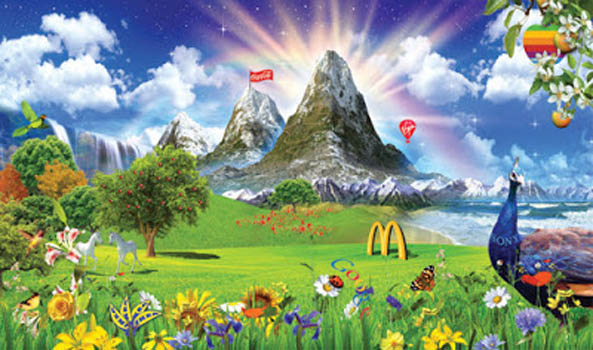No Utopia but there is the Kingdom
Have you ever longed for a place where peace and human harmony is not just a dream? A place where people worked together, shared together and genuinely cared for one another? A place where conflict, rivalry, violence is absent or abolished entirely? Despite best intentions and best efforts, the lesson we learn from the neo-socialists, communists, democratic governments is that mankind is unable to engineer the perfect society. Why have countless other humanly devised utopian concepts of social and government order been so unsuccessful? The answer can be found in the very name given to these ventures. It’s the word “utopia.” The word taken from Greek literally means “no place.” The reality is that there never has been a place on earth where human beings created a perfect peaceful community.
Yet so many people continue to yearn for Utopia, where all is peace and all is harmony and where there is no fear but only love and care for one another. Can we ever achieve a community of peace? I don’t think any government or political leader can save us or bring about a perfect world. No one political party has all the answers or will automatically make this world a better place. The world is broken – God’s kingdom is not on earth as it is in heaven. And often it has been the very people who claim to create an earthly Paradise that have caused the brokenness.The good news is that the Scripture shows us how peace and perfection will arrive on earth.
In the first reading, the Prophet Isaiah, our principal prophet for this season of Advent, shares with us a prophetic dream of a future society, a perfect paradise. All hatreds and hostilities have disappeared, those who hated and killed and their victims are now sitting side by side, the lion and the leopard lie down with the lamb and the gazelle, the child plays with the poisonous snake. Nobody is doing any harm, the poor and the weak are no longer oppressed by injustice, all seems lovey dovey. It is Paradise restored. Sounds like Utopia, right? Problem is that this ‘paradise’, this ‘utopia,’ exists in no place. But will this ever take place? Well, the Prophet Isaiah provides the clue – he points to the shoot that will spring from the stump of Jesse.
The stock or the stump of Jesse actually refers to another failed project, the broken line of the dynasty of David. The dynasty of King David had been cut down like a tree by the Babylonians in 587 B.C. when the city of Jerusalem and the Kingdom of Judah was devastated and the ruling class led into exile. The people were shocked to realise that the dynasty was not really eternal. But had not God assured David: “your house and your kingdom shall endure forever before me; your throne shall stand firm forever” (2 Sam 7:16). Isaiah knew that God must always be true to his word; hence the dynasty in some way will revive. The spirit of the Lord will rest upon the stump and the roots of Jesse, and the people of God will bloom again. New life can emerge from what is perceived as a dead tree. But the solution would not be a human one. It is through God’s direct intervention that the dead tree stump would spring to life again. We need a Saviour. Christ would be the answer.
The second reading also presents us with a similarly utopian vision, now of the Church. But the realities that plagued the Church during the time of St Paul’s writings were in fact dystopian. There was building tension between two group of Christians within the community. The smaller group, described as the “weak,” liked very much a traditional form of religion, prayed a lot and mortified themselves, and observed a lot of prescriptions. The other group, named the “strong,” did not pay attention to such “small” things, which they considered trivial, and held that one did not have to follow a legal practice like the old law; the only necessary thing was to be faithful to Christ. The two groups abused each other: the weak “passed judgment” on the strong ones, calling them unfaithful and these, in their turn “had contempt” for the weak ones, classifying them as traditionalists and without understanding. Sounds familiar?
St Paul recommends to all to be charitable, to show love and reciprocal respect. He takes the example from the Lord who did not seek to please himself but placed himself at the service of others. Harmony in the community could only be assured by the member’s commitment to Christ. St Paul challenged the “strong” as well as the “weak” to “treat each other in the same friendly way as Christ treated” them. Rather than engage in mutual criticism that would only engender hostility, they should learn “to be tolerant with each other, following the example of Christ Jesus, so that united in mind and voice (they) may give glory to God and Father of our Lord Jesus Christ.” Christ makes all the difference!
Finally, we come to the gospel and discover the key to Peace. It is to be found in repentance. In today’s gospel, we hear the story of how St John the Baptist preached this message, “Repent, for the Kingdom of heaven is close at hand.” His ministry and message resonates with the call of the Prophet Isaiah, “Prepare a way for the Lord, make his paths straight.” Unfortunately, John’s call to repentance to prepare the way of the Lord was not received by all.
What does the word Repentance mean? In Hebrew, the word for conversion (shubh) indicates that one has taken a wrong path, and once he has become aware of his detour, the individual returns to the right path in order to return to God. So too the Greek word, metanoia involves not just a static remorse but a dynamic and determined about-face, a positive commitment to a new way of life. Significantly, conversion is not a purely human decision or endeavour. Rather, conversion is a human response to the prior initiative of God.
Repentance means turning to Christ. It means putting God in the first place in our lives and making sure that everything else finds its rightful places in our lives under God. Repentance means letting go of our own will, in order to follow the things that God wills for us. It means turning away from sin and all rebellion against God, in order to be obedient to God and to follow him in all that he wants from us. Repentance means owning up to our sin, our human frailties, our fears, our inner hurts and entrusting all these to God’s mercy and compassion. Repentance means knowing our need of God. In turning our lives around, we come to recognise that our self-sufficiency is inadequate and that we need to cooperate with God in our own salvation. Repentance therefore is not a one-time thing. It is a process that goes on for a lifetime. Little by little we orientate ourselves ever more perfectly in God’s love.
So as we continue our journey to Christmas, we need to repent of our comfortableness with sin. This is the only way our society and the Church can be transformed. Various utopian experiments that have sought to improve mankind and create a peaceable environment have failed. Lasting peace would not be found in any peace treaty or socio-political or economic reform. This is because, if God is not part of the equation, Utopia would remain a dream. But God’s effort to bring peace will not fail. It will succeed—through Jesus Christ and the establishment of God’s Kingdom. That is why we need to come out into the wilderness where God reforms and transforms His People – on His terms and not our own. Avail yourself to the very reason Jesus came as a Child to Bethlehem: he come down to be among sinners. Yes, but he came to call us into the Kingdom of Light. So prepare the Way of the Lord!
Following is the audio version of the above homily:

